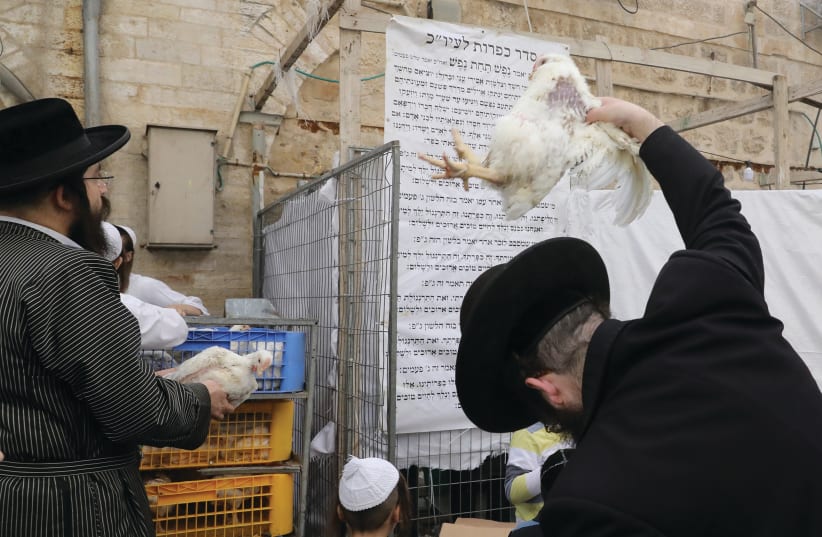The year was sometime in the 1970s when I was living in Israel the first time. Rosh Hashanah had passed, and the “days of awe” were almost over. The morning before Yom Kippur, the Day of Atonement, I decided to go to Mahaneh Yehudah, Jerusalem’s dynamic, colorful, outdoor Jewish produce market, just a few blocks from the center of town, to do my fruit and vegetable shopping, as I always did each week.
As I entered the crowded, covered pathway, my ears were suddenly shattered by loud, whirring sounds. A strange smell penetrated the air. Further into the narrow alleyway, which was known as the main walk-through market street, I walked. Under my feet, there appeared to be a carpet of feathers.
Crate upon crate of live chickens were stacked in front of every tiny butcher shop. At each store, the scene was the same. Mobs of people stood anxiously next to the crates. A man, bearded and wearing the traditional black coat and hat, stood with a prayer book in one hand. One at a time, people pushed forward to be near him.
I listened as verses from the Bible were recited:
“Crazed because of the way of their transgression,And afflicted because of their iniquities—Their soul abhorred of all manner of food,And they drew near unto the gates death—They cried unto the Lord in their trouble,And He saved them out of their distresses,He sent His word, and healed them,And delivered them from their graves. (Psalm 107:17-20)
The man read on:“If there be for him an angel,An intercessor, one among a thousand,To vouch for a man’s uprightness;Then He is gracious unto him, and saith:‘Deliver him from going down to the pit,I have found a ransom.’” (Job 33:23-24)
One at a time, the people would stand, while a live chicken (cock for a male and hen for a female) was held in the black-coated man’s right hand. The fowl was then waved around the head of the person standing there, three times, while the bearded man said: “This is in exchange for me; this is instead of me; this is a ransom for me.”
Within seconds of the verses being finished, in full view of the penitent, the bird was slaughtered and then thrust into the machine for defeathering. The person paid for the bird and walked away to give the bird to the poor or home to make chicken soup for the pre-Yom Kippur fast meal.
This is the Kapparot (expiation) ceremony whereby all sins of the individual are transferred to the fowl. The Kapparot ceremony is derived from the time of the Temple in Jerusalem when a goat (scapegoat) was sent from the Temple into the desert to carry with it the sins of the people.
After the Romans destroyed the Second Temple, the practice of sacrificing animals came to an end, but, as a means of substitution, the Kapparot ceremony was introduced.
Forty years ago, in modern Israel, in Jerusalem, Israel’s ancient and modern capital, this ceremony took place. Does it take place today? Not in Mahaneh Yehudah, for it has been outlawed.
The writer is a journalist, author, compiler/contributor/editor of nine kosher cookbooks (working on a 10th) and food writer for North American Jewish publications. She lives in Jerusalem where she has led weekly walks of Mahaneh Yehudah in English since 2009. She wrote the kosher Jerusalem restaurant features for Janglo.net, the oldest, largest website for English speakers from 2014 to 2020.
